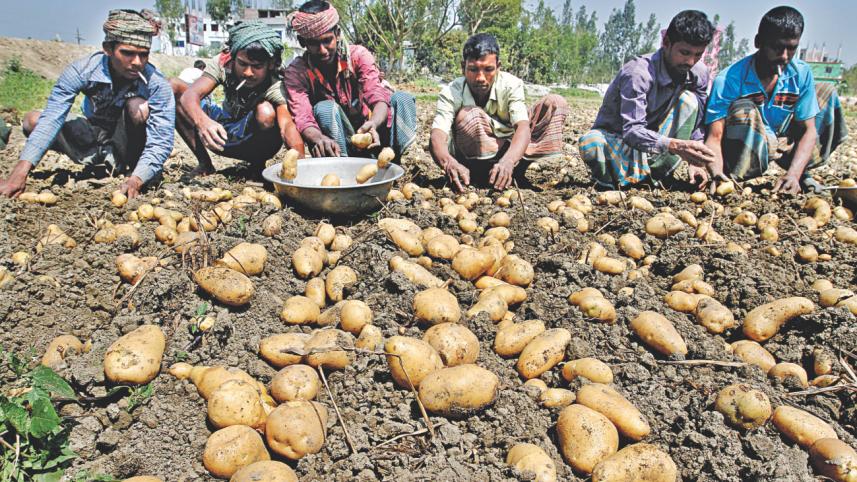Farmers struggle to recover loss

Last winter, Naresh Chandra Biswas grew potato, cauliflower and cabbage on two acres of land.
He invested Tk 1.2 lakh, hoping to make a good profit from the yield. But fate had something else in store for him. All he got from sale of his produce was Tk 47,000, about one-third his investment.
"I had to sell potato at Tk 3-4 a kg and fed most of the cauliflowers and cabbages to the cattle," said Naresh, 47, of Berakuthi village in Nilphamari Sadar.
Thanks to the indefinite countrywide blockade since January 6, his area saw a low turnout of wholesale traders who buy vegetables from farmers and ship it to different markets in Dhaka and Chittagong. Truckers would mostly stay off the road, fearing petrol bomb attacks that have already claimed around 70 lives across the country.
As a result, the vegetables Naresh grew would often either perish in the field or were sold at a shockingly cheap rate.
Failing to recoup even his investment, Naresh was forced to lease out 60 decimals of his six acre land to pay off the fertiliser and pesticide dealers he owed.
He faced a similar fate during the previous winter as well due to hartals ahead of the January 5 polls last year.
"It has become very difficult to eke a living off farming. Every time we hope for some stability, things get only worse. We are deprived of just prices [for our produces]," he told The Daily Star over the phone recently.
Millions of farmers like Naresh are bearing the brunt of hartals and blockades by the BNP-led alliance for almost three months now.
The Daily Star interviewed farmers from Gaibandha, Nilphamari, Rajshahi, Natore, Chapainawabganj, Meherpur, Jessore, Narsingdi, Barisal and Pirojpur districts.
They said the country's northern and south-western districts had been more affected than those in other parts. It is because these districts are more linked to the vegetables and other crop markets in Dhaka, Chittagong and elsewhere.
Jahangir Alam, an agriculture economist and former director general of Bangladesh Livestock Research Institute, estimates that the farming sectors lost around Tk 200-250 crore every day during last winter due to the blockade.
Most truckers wouldn't work fearing bomb attacks by blockaders, and those who would work would charge double the usual fare.
"We have learnt that a trucker who usually charges Tk 10,000 to transport vegetables from Rangpur to Dhaka demanded Tk 20,000 or more for the same job during the blockade," he said.
"Much of the vegetables perished or was sold at a very low price," Alam said, adding that such events have rendered many rural people jobless in the last three months.
LOW RICE PRICE ANOTHER CONCERN
Already in a tight corner, farmers fear a far worse time ahead as the prices of paddy and rice have recently slumped and it happened right ahead of Boro harvesting season, which starts in late April.
According to the agriculture ministry, the production cost of paddy and rice this Boro season will be Tk 20 and Tk 27 a kg. But farmers said each kg of paddy now sells at Tk 15-16 and coarse rice at Tk 25-26. And the price may go further down with the new harvest.
"In December-January, I sold paddy at Tk 17.5 per kg, but it came down to Tk 15 in March," said Bibha Begum, a marginal farmer of Bandapur village in Rajshahi's Tanore.
The picture was somewhat the same elsewhere, and farmers blame it on rice import from India.
Farmer Babul Akhter of Jessore's Sharsha said while Bangladeshi fine rice was sold at between Tk 45 and 48 per kg, Indian rice of same quality is available for Tk 38-40.
According to the commerce ministry, private sector imported around 11 lakh tonnes of rice from India since June last year, and are continuing to do so despite the promise of a bumper Boro output this season.
Farmers and analysts believe if rice import continues this way even when the Boro harvest begins, it will adversely affect farmers, who account for more than half the country's 16 crore people.
Ataur Rahman, director general of Food Policy Monitoring Unit of the food ministry, said it's the private sector, not the government, which is importing rice, and asked this reporter to contact the commerce ministry for further queries.
Contacted, a commerce ministry official said, "If we restrict rice import in a free market, the rice prices will go up and it will affect consumers."
The official added the ministry had no plan to ban the import.
Given the situation, the government should give higher allocation in the next budget to compensate the affected farmers. Otherwise, farmers will invest less in future and the country may face food insecurity, noted Jahangir Alam of the Livestock Research Institute.
"To strike a balance between the prices of Indian and the local rice, the government should impose duty on rice import," he added.




 For all latest news, follow The Daily Star's Google News channel.
For all latest news, follow The Daily Star's Google News channel.
Comments